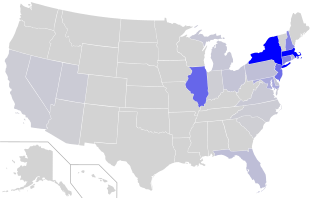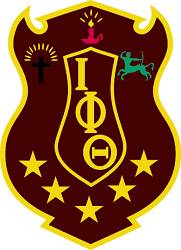
Icaria, also spelled Ikaria, is a Greek island in the Aegean Sea, 10 nautical miles (19 km) southwest of Samos.

The Icarians were a French-based utopian socialist movement, established by the followers of politician, journalist, and author Étienne Cabet. In an attempt to put his economic and social theories into practice, Cabet led his followers to the United States of America in 1848, where the Icarians established a series of egalitarian communes in the states of Texas, Illinois, Iowa, Missouri, and California. The movement split several times due to factional disagreements.

Greek Americans are Americans of full or partial Greek ancestry. The lowest estimate is that 1.2 million Americans are of Greek descent while the highest estimate suggests over 3 million. According to the US census, 264,066 people older than five spoke Greek at home in 2019.

Count Alexei (Alexey) Grigoryevich Orlov-Chesmensky was a Russian soldier, general-in-chief, general admiral and statesman, who rose to prominence during the reign of Catherine the Great. His joint victory with Grigory Spiridov and Samuel Greig in the Battle of Chesma put him in the ranks of the outstanding Russian military commanders of all time; and although he lacked naval experience, he was the only authority in those circumstances who could ensure proper co-ordination of action.

Omega Psi Phi Fraternity, Inc. (ΩΨΦ) is a historically African-American fraternity. The fraternity was founded on November 17, 1911, the first at a historically black university, by three Howard University students, Edgar Amos Love, Oscar James Cooper and Frank Coleman, and their faculty adviser, Dr. Ernest Everett Just. Since its founding the organization has chartered over 750 undergraduate and graduate chapters.

Phi Beta Sigma Fraternity, Inc. (ΦΒΣ) is a historically African American fraternity. It was founded at Howard University in Washington, D.C., on January 9, 1914, by three young African-American male students with nine other Howard students as charter members. The fraternity's founders, A. Langston Taylor, Leonard F. Morse, and Charles I. Brown, wanted to organize a Greek letter fraternity that would exemplify the ideals of Brotherhood, Scholarship and Service while taking an inclusive perspective to serve the community as opposed to having an exclusive purpose. The fraternity exceeded the prevailing models of Black Greek-Letter fraternal organizations by being the first to establish alumni chapters, youth mentoring clubs, a federal credit union, chapters in Africa, and a collegiate chapter outside of the United States. It is the only fraternity to hold a constitutional bond with a historically African-American sorority, Zeta Phi Beta (ΖΦΒ), which was founded on January 16, 1920, at Howard University in Washington, D.C., through the efforts of members of Phi Beta Sigma.

The National Pan-Hellenic Council (NPHC) is a collaborative umbrella council composed of historically African American fraternities and sororities, commonly called the Divine Nine, and also referred to as Black Greek Letter Organizations (BGLOs). The NPHC was formed as a permanent organization on May 10, 1930, on the campus of Howard University, in Washington, D.C., with Matthew W. Bullock as the active Chairman and B. Beatrix Scott as Vice-Chairman. NPHC was incorporated under the laws of the State of Illinois in 1937.

Failaka Island is a Kuwaiti Island in the Persian Gulf. The island is 20 km off the coast of Kuwait City in the Persian Gulf. The name "Failaka" is thought to be derived from the ancient Greek φυλάκιο(ν) – fylakio(n) "outpost".

Unley is an inner-southern suburb of Adelaide, South Australia, within the City of Unley. The suburb is the home of the Sturt Football Club in the South Australian National Football League (SANFL). Unley neighbours Adelaide Park Lands, Fullarton, Hyde Park, Malvern, Parkside and Wayville.

Iota Phi Theta Fraternity, Inc. (ΙΦΘ) is a historically African American fraternity. It was founded on September 19, 1963, at Morgan State University in Baltimore, Maryland, and is currently the 5th largest Black Greek Lettered Fraternity. Members of the close-knit afrocentric fraternity proudly embrace the organization’s youth, uniqueness, individualism and modern idealism. As a contemporary organization, many members have had the great honor of meeting, fellowshipping with and/or engaging in personal or virtual discussions with one or more of their founders. Today there are over 301 undergraduate and alumni chapters, as well as colonies located in 40 U.S. states, the District of Columbia, The Bahamas, Colombia, South Korea, and Japan.

Phi Sigma Alpha (ΦΣΑ), commonly known as La Sigma, is a Puerto Rican fraternity originally established as the Sigma Delta Alpha Fraternity on October 22, 1928, at the University of Puerto Rico by twelve students and a professor. Phi Sigma Alpha can trace its roots back to 1898 to the Union Hispano Americana, as well as to the first ever Greek letter Hispanic-oriented fraternity, Sigma Iota, established in 1912. By 1998 there were over 4,376 members.

The Italian Islands of the Aegean were an archipelago of fourteen islands in the southeastern Aegean Sea, that—together with the surrounding islets—were ruled by the Kingdom of Italy from 1912 to 1943 and the Italian Social Republic from 1943 to 1945. When the Kingdom of Italy was restored, they remained under formal Italian possession until they were ceded to Greece in 1947 under the Treaty of Paris.
Rusyn Americans are citizens of the United States of America, with ancestors who were Rusyns, from Carpathian Ruthenia, or neighboring areas of Central Europe. However, some Rusyn Americans, also or instead identify as Ukrainian Americans, Russian Americans, or even Slovak Americans.
Dimitris Poulianos was a Greek artist responsible for creating a large body of oil paintings and charcoal drawings that continue to hold value amongst private collectors and prominent, international galleries. Poulianos trained at the Athens School of Fine Arts with Georgiou Roilo in 1923 and then 1924–28 at the Académie Julian in Paris where he was awarded the Smit prize. In 1931, he was awarded an MA in Art from Columbia University, New York. He was known for "living and breathing his art" and never took a wife. His work is characterized by turbulent, expressionistic outdoor scenes with a particular love for the sea and night sky. Exhibitions were offered to him early in his career at galleries in Athens, Paris and New York which has generated a strong interest in his work by collectors around the world. A book covering his work has recently been published by ikarianstudies.org in 2008 as a result of extensive research undertaken by Petros Themeles, with cooperation from the children of his nephews, Constantinos and Aris Poulianos and others amongst the remaining relatives, personal friends and collectors who retain his original work.
Anton Nikë Berisha is an Albanian scholar and folklorist. He has been teaching Albanian at the University of Calabria since 1992, and is considered an expert in Albanian oral and Arbëreshë literature. He is one of the Albanologists who have carried out extensive research on Albanian epic poetry, in particular collecting and publishing Kângë Kreshnikësh, the traditional songs of the heroic legendary cycle of Albanian epic poetry.

The 1924 United States presidential election in Ohio was held on November 4, 1924 as part of the 1924 United States presidential election. State voters chose twenty-four electors to the Electoral College, who voted for president and vice president.

Ioannis Malachias was born in Xylosyrtis, Ikaria, in 1880 and died in Agios Kirykos, Ikaria, in 1958. He was a Greek doctor from Ikaria and was the leader of the Ikarian Revolution against the Ottoman Empire in 1912, serving as the first and only president of the Free State of Ikaria between 17 July and 4 November 1912.

Leone Viale was an Italian admiral and politician. He was Minister of the Navy of the Kingdom of Italy in the first and second Salandra governments at the time when Italy entered the First World War.














